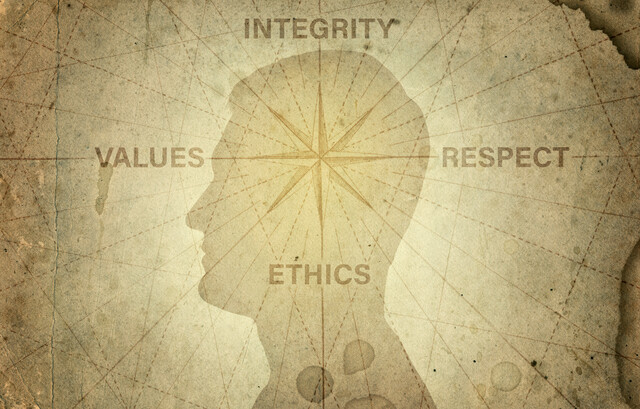Online Class: Introduction to Ethics

no certificate
with CEU Certificate*
-
15Lessons
-
37Exams &
Assignments -
958Students
have taken this course -
7Hours
average time -
0.7CEUs
Course Description
Embarking on the vast expanse of moral philosophy, this immersive course offers a captivating exploration into the world of ethics. More than just a theoretical study, ethics delves into the very fabric of human behavior, urging us to question and reflect upon the principles that guide our actions. Imagine possessing the ability to discern the nuances between what's 'right' and what's merely 'acceptable'.
In the initial nine modules, we unravel the tapestry of moral codes, laying a robust foundation that illuminates the pillars of righteousness, integrity, and virtue. The inaugural lesson unveils the lexicon of ethics, beckoning you into its intriguing world. As we journey from the ancient footprints of philosophical thought to the contemporary dilemmas, lessons two and three chronicle the evolution of ethical thought. The subsequent sessions meticulously dissect foundational ethical theories, offering profound insights into virtue, the social contract, and deontological principles.
A nuanced understanding of ethics remains incomplete without applying it to real-life conundrums. Lessons ten through fifteen present an exhilarating challenge, plunging students into the depths of ethical dilemmas across a plethora of disciplines-be it the corporate corridors, the solemnity of medicine, the intricate world of law, or the bastions of education. Through these modules, you'll learn to scrutinize everyday scenarios, honing your ability to make ethically informed decisions.
Each module is meticulously designed to encourage introspection, peppered with thought-provoking questions that culminate in a quiz. The accompanying answer key is a treasure trove, offering rationale-rich insights, inviting students to revisit and re-examine the text. By the journey's end, you'll not only possess a panoramic view of ethics from its embryonic stages to its modern-day manifestations but also the acumen to apply these principles with finesse and sensitivity.
Course Modules:
- Diving into Ethics: An Introduction
- Tracing Ethical Footprints: Ancient to Renaissance
- From Enlightenment to Modern Ethics
- Branching Out: The Four Pillars of Ethics
- The Odyssey of Moral Evolution
- Straddling Cultures: Universality and Relativity in Ethics
- The Quintessence of Virtue and Natural Law
- Duty Calls: Delving into Deontology and the Social Covenant
- Deciphering Social Contract Theories
- Navigating Ethical Labyrinths: Personal Realm
- Corporate Conundrums: Ethics at Work
- Balancing Scales: Ethics in Medicine and Judiciary
- Boardrooms and Beyond: Ethical Imperatives in Business
- Governance and Ethics: Steering the Ship Right
- Constructing Moral Edifices: Ethics in Education and Architecture
Join us on this transformative journey, and emerge with a refined moral compass, steering through the multifaceted terrains of today's globalized society.
- Completely Online
- Self-Paced
- Printable Lessons
- Full HD Video

- 6 Months to Complete
- 24/7 Availability
- Start Anytime
- PC & Mac Compatible
- Android & iOS Friendly
- Accredited CEUs

Course Lessons
Lesson 1. Core Principles of Ethics Explained
Essential for societal cohesion, ethics provides a foundation for shared conduct and public policies. By examining core principles like justice and beneficence, we foster a flourishing life with minimal harm to others.Lesson 2. Socrates, Plato, and Aristotle: The Pioneers of Western Ethics
Beginning with Socratic questioning and Aristotle's systematic analysis, philosophy has long sought to define human happiness and purpose. This philosophical lineage informed early Christian thought, merging historical insights with scripture to create an evolving moral compass guiding modern ethical discourse.Lesson 3. Kant and Mill: Foundations of Modern Ethics
Kant's ethics, emphasizing reason and duty, categorizes duties as perfect or imperfect, focusing on intentions over outcomes. Mill's consequentialism, rooted in utilitarianism, values actions that maximize happiness, with applications in policy and rights debates.Lesson 4. Journey Through Ethical Theories
Descriptive ethics observes and compares real-world moral beliefs and behaviors across cultures and times, providing empirical insights into ethical diversity. This branch helps understand how personal interests and societal norms influence actions and ethical decisions globally.Lesson 5. Building Blocks of Moral Growth: Piaget, Kohlberg, and Gilligan
Moral development is central to understanding human interactions, encompassing how we learn to distinguish right from wrong while creating ethical principles. Influenced by individual experiences, cultural norms, and societal expectations, it shapes personal identities and collective behaviors.Lesson 6. Ethics Across Cultures
The philosophical debate between Universalism and Relativism explores the foundations of ethical principles, with Universalism suggesting immutable moral truths and Relativism advocating for culturally dependent judgments. This dialogue extends beyond philosophy, influencing sociologists and anthropologists in examining the universality versus cultural specificity of moral values.Lesson 7. Virtue Ethics Explained: A Journey of Philosophical Pursuits
The convergence of virtue ethics and natural law underscores humanity's intrinsic good, fostering ethical communities and aligning with concepts like corporate social responsibility. This synthesis highlights the applicability of ethical principles, helping to ground societal and corporate actions within universally recognized moral standards.Lesson 8. Social Contract Philosophies: From Hobbes to Modern Implications
Deontology faces criticism for its rigid adherence to duty, potentially leading to conflict in ethical dilemmas, such as prioritizing action over consequences in moral decisions. Critics argue it overlooks situational needs, advocating for a flexible ethics approach that incorporates consequentialism's and virtue ethics' elements for a nuanced perspective.Lesson 9. Ethical Dualities: Exploring Utilitarianism and Care Ethics
Utilitarianism proposes that ethical actions maximize collective happiness, but its reliance on predicted outcomes can lead to moral ambiguity. Care ethics, developed as a counterpoint, emphasizes the moral significance of relationships and care, promoting a nurturing approach that challenges conventional justice-focused ethics.Lesson 10. Crafting and Living Your Personal Code of Ethics
Creating a personal code of ethics is about defining your fundamental beliefs and how they guide your actions and decisions. This introspective process not only clarifies your convictions but also fosters a life enriched by integrity and purpose.Lesson 11. Navigating Workplace Ethics: Principles and Applications
Ethical lapses, although seemingly small, can trigger detrimental outcomes, such as eroding trust and compromising safety. Upholding core values like fairness and caring in workplaces leads to constructive environments and successful outcomes.Lesson 12. Core Ethical Principles in Healthcare and Legal Professions
Legal and medical professionals alike face ethical challenges that require balancing confidentiality with public safety, managing conflicts of interest, and advocating for fair treatment. By applying ethical principles across disciplines, practitioners can navigate these dilemmas effectively, aligning professional conduct with societal expectations.Lesson 13. Navigating Ethical Challenges in Business Environments
Business ethics are the moral compass of organizations, shaping interactions with clients and internal operations, while fostering long-term sustainability through trust and fairness. Companies that value ethical decision-making, transparency, and consumer respect build loyal customer bases and successful brands, as demonstrated by companies like Unilever and Patagonia that prioritize sustainability.Lesson 14. Navigating the Complex World of Ethics in Politics and Journalism
The interplay of political and journalistic ethics is crucial during elections and policy scrutinization, where journalists act as watchdogs for political accountability. This relationship ensures informed public discourse and supports the democratic process.Lesson 15. Navigating Ethics in Education and Social Work: Principles and Challenges
Ethics in education and social work is vital, with professionals tasked with balancing moral principles and real-world demands to improve individual and societal outcomes. Despite historical and ongoing challenges, ethically guided practices in these fields support transformative contributions, aiming for a fairer, more just society.
Learning Outcomes
- Define and describe foundational ethical principles such as autonomy, beneficence, nonmaleficence, and justice and apply them to real-world scenarios.
- Identify ethical challenges arising in modern society, such as AI, privacy, and climate change, and propose solutions based on core ethical principles.
- Analyze the integration of Christian theological doctrines with classical philosophical traditions by exploring the dialogue between figures like Augustine and Aquinas.
- Define the historical influence of key philosophers such as Socrates, Plato, and Aristotle on ethical development through identification of their distinct contributions.
- Demonstrate understanding of Kant's ethical theory by explaining the categorical imperative and its application to moral actions.
- Identify the core principles of Mill's utilitarianism and assess its influence on contemporary ethical debates and decision-making.
- Define and differentiate the four primary branches of ethics: normative ethics, descriptive ethics, meta-ethics, and applied ethics, by providing examples of their applications.
- Demonstrate understanding of normative ethical frameworks by analyzing scenarios where different ethical principles, such as consequentialism, deontology, and virtue ethics, would guide decision-making.
- Define the stages of moral development according to Piaget and Kohlberg, including key characteristics and age ranges.
- Identify and compare the different perspectives on moral reasoning advanced by Kohlberg and Gilligan, emphasizing the role of gender and ethical dimensions such as justice and care.
- Define Universalism and Relativism by describing their core tenets and primary philosophical arguments.
- Identify and analyze key philosophers' contributions to the debate between Universalism and Relativism, using specific examples from their works.
- Define the concept of eudaimonia and evaluate its role in virtue ethics as a measure of human flourishing.
- Demonstrate mastery of lesson content at levels of 70% or higher.
Additional Course Information

- Document Your Lifelong Learning Achievements
- Earn an Official Certificate Documenting Course Hours and CEUs
- Verify Your Certificate with a Unique Serial Number Online
- View and Share Your Certificate Online or Download/Print as PDF
- Display Your Certificate on Your Resume and Promote Your Achievements Using Social Media

Choose Your Subscription Plan
No Certificate / No CEUs
This course only
| Includes certificate | X |
| Includes CEUs | X |
| Self-paced |

|
| Instructor support |

|
| Time to complete | 6 months |
| No. of courses | 1 course |
Certificate & CEUs
This course only
| Includes certificate |

|
| Includes CEUs |

|
| Self-paced |

|
| Instructor support |

|
| Time to complete | 6 months |
| No. of courses | 1 course |
Certificates & CEUs
Includes all 600+ courses
| Includes certificate |

|
| Includes CEUs |

|
| Self-paced |

|
| Instructor support |

|
| Time to complete | 12 Months |
| No. of courses | 600+ |
Certificates & CEUs
Includes all 600+ courses
| Includes certificate |

|
| Includes CEUs |

|
| Self-paced |

|
| Instructor support |

|
| Time to complete | 24 Months |
| No. of courses | 600+ |
Student Testimonials
- "The course was very helpful. It will definitely help me in both my personal and professional life to make better and ethical decisions that will take ethics and impact on others into consideration." -- Robert K.
- "This course was very helpful because it showed the right and wrong when it comes to your place of employment." -- Samantha T.
- "It has opened my eyes as to how we should act in the world." -- Kayla T.
Related Courses
-
 10 hours
1.0 CEUs
Memory and Concentration Techniques
+ More Info
10 hours
1.0 CEUs
Memory and Concentration Techniques
+ More Info
-
 72 hours
7.2 CEUs
Writing Help Course Bundle
+ More Info
72 hours
7.2 CEUs
Writing Help Course Bundle
+ More Info
-
 25 hours
2.5 CEUs
Human Resources Productivity Course Bundle
+ More Info
25 hours
2.5 CEUs
Human Resources Productivity Course Bundle
+ More Info
-
 36 hours
3.6 CEUs
Ultimate Secretary Training Bundle
+ More Info
36 hours
3.6 CEUs
Ultimate Secretary Training Bundle
+ More Info
-
 7 hours
0.7 CEUs
Time Management 101
+ More Info
7 hours
0.7 CEUs
Time Management 101
+ More Info
-
 5 hours
0.5 CEUs
Listening Skills
+ More Info
5 hours
0.5 CEUs
Listening Skills
+ More Info
-
 7 hours
0.7 CEUs
Healthy Relationships
+ More Info
7 hours
0.7 CEUs
Healthy Relationships
+ More Info
-
 6 hours
0.6 CEUs
Delegation Skills
+ More Info
6 hours
0.6 CEUs
Delegation Skills
+ More Info
-
 5 hours
0.5 CEUs
Emotional Intelligence
+ More Info
5 hours
0.5 CEUs
Emotional Intelligence
+ More Info
-
 3 hours
0.3 CEUs
How to Improve Your Concentration
+ More Info
3 hours
0.3 CEUs
How to Improve Your Concentration
+ More Info
-
 6 hours
0.6 CEUs
Business Branding 101
+ More Info
6 hours
0.6 CEUs
Business Branding 101
+ More Info
-
 6 hours
0.6 CEUs
Personal Assistant 101
+ More Info
6 hours
0.6 CEUs
Personal Assistant 101
+ More Info
-
 8 hours
0.8 CEUs
Strategic Planning
+ More Info
8 hours
0.8 CEUs
Strategic Planning
+ More Info
-
 11 hours
1.1 CEUs
How to Write Effective Policies and Procedures
+ More Info
11 hours
1.1 CEUs
How to Write Effective Policies and Procedures
+ More Info
-
 7 hours
0.7 CEUs
Negotiation Skills
+ More Info
7 hours
0.7 CEUs
Negotiation Skills
+ More Info
-
 5 hours
0.5 CEUs
Mastering Conversation Skills
+ More Info
5 hours
0.5 CEUs
Mastering Conversation Skills
+ More Info
-
 5 hours
0.5 CEUs
How to Write a Business Plan
+ More Info
5 hours
0.5 CEUs
How to Write a Business Plan
+ More Info
-
 7 hours
0.7 CEUs
Management Consultant 101
+ More Info
7 hours
0.7 CEUs
Management Consultant 101
+ More Info
-
 8 hours
0.8 CEUs
Become a General Secretary
+ More Info
8 hours
0.8 CEUs
Become a General Secretary
+ More Info
-
 9 hours
0.9 CEUs
How to Write a Grant Proposal
+ More Info
9 hours
0.9 CEUs
How to Write a Grant Proposal
+ More Info
-
 5 hours
0.5 CEUs
Workplace Safety
+ More Info
5 hours
0.5 CEUs
Workplace Safety
+ More Info
-
 7 hours
0.7 CEUs
How to Deal with Difficult Personalities
+ More Info
7 hours
0.7 CEUs
How to Deal with Difficult Personalities
+ More Info
-
 3 hours
0.3 CEUs
Job Performance Appraisals - A How To Guide
+ More Info
3 hours
0.3 CEUs
Job Performance Appraisals - A How To Guide
+ More Info
-
 7 hours
0.7 CEUs
Employment Law Fundamentals
+ More Info
7 hours
0.7 CEUs
Employment Law Fundamentals
+ More Info
-
 12 hours
1.2 CEUs
How to Write Case Studies
+ More Info
12 hours
1.2 CEUs
How to Write Case Studies
+ More Info
-
 5 hours
0.5 CEUs
The Art of Setting Goals
+ More Info
5 hours
0.5 CEUs
The Art of Setting Goals
+ More Info
-
 5 hours
0.5 CEUs
Creative Thinking Skills
+ More Info
5 hours
0.5 CEUs
Creative Thinking Skills
+ More Info
-
 12 hours
1.2 CEUs
Telephone Skills and Quality Customer Service
+ More Info
12 hours
1.2 CEUs
Telephone Skills and Quality Customer Service
+ More Info
-
 5 hours
0.5 CEUs
Team Building 101
+ More Info
5 hours
0.5 CEUs
Team Building 101
+ More Info
-
 6 hours
0.6 CEUs
Confidence Building
+ More Info
6 hours
0.6 CEUs
Confidence Building
+ More Info
-
 8 hours
0.8 CEUs
Virtual Assistant 101
+ More Info
8 hours
0.8 CEUs
Virtual Assistant 101
+ More Info
-
 11 hours
1.1 CEUs
Mediation 101
+ More Info
11 hours
1.1 CEUs
Mediation 101
+ More Info






